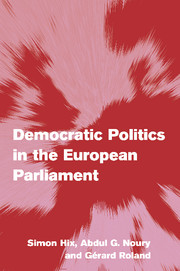Book contents
- Frontmatter
- List of Contents
- List of figures
- List of tables
- List of boxes
- Acknowledgements
- Introduction
- Chapter 1 Development of the European Parliament
- Chapter 2 Democracy, transaction costs and political parties
- Chapter 3 Ideological not territorial politics
- Chapter 4 Participation
- Chapter 5 Trends in party cohesion
- Chapter 6 Agenda-setting and cohesion
- Chapter 7 Who controls the MEPs?
- Chapter 8 Competition and coalition formation
- Chapter 9 Dimensions of politics
- Chapter 10 Investiture and censure of the Santer Commission
- Chapter 11 The Takeover Directive
- Conclusion
- Bibliography
- Index
Conclusion
Published online by Cambridge University Press: 22 September 2009
- Frontmatter
- List of Contents
- List of figures
- List of tables
- List of boxes
- Acknowledgements
- Introduction
- Chapter 1 Development of the European Parliament
- Chapter 2 Democracy, transaction costs and political parties
- Chapter 3 Ideological not territorial politics
- Chapter 4 Participation
- Chapter 5 Trends in party cohesion
- Chapter 6 Agenda-setting and cohesion
- Chapter 7 Who controls the MEPs?
- Chapter 8 Competition and coalition formation
- Chapter 9 Dimensions of politics
- Chapter 10 Investiture and censure of the Santer Commission
- Chapter 11 The Takeover Directive
- Conclusion
- Bibliography
- Index
Summary
We have analysed in this book for the first time all roll-call votes by MEPs in the five elected European Parliaments since 1979. This research has delivered important insights both from the point of view of political science in general and from the point of view of the study of European Union institutions.
The European Parliament is a unique object of study. It has elected representatives from all the main party families in Europe (conservatives, socialists, liberals, greens, variants of the extreme left and extreme right as well as anti-Europeans) from a growing number of countries (9 in 1979, 10 since 1981, 12 since 1986, 15 since 1995, and 25 since 2004). It has the potential to be the most fragmented parliament in the world. Studying the European Parliament is a good test of two opposing views of democracy: the citizen-delegate view on the one hand, according to which fragmentation is desirable because it allows a close connection between representatives and their home constituency; and the party-based view on the other, according to which it is desirable for elected representatives to group into disciplined political parties. The European Parliament clearly follows the model of party-based democracy.
In its young life, the European Parliament has evolved quickly towards a robust party system, as has been the case in the history of most legislatures. The European Parliament is a particularly interesting case to study the formation of a party system.
- Type
- Chapter
- Information
- Democratic Politics in the European Parliament , pp. 216 - 220Publisher: Cambridge University PressPrint publication year: 2007



